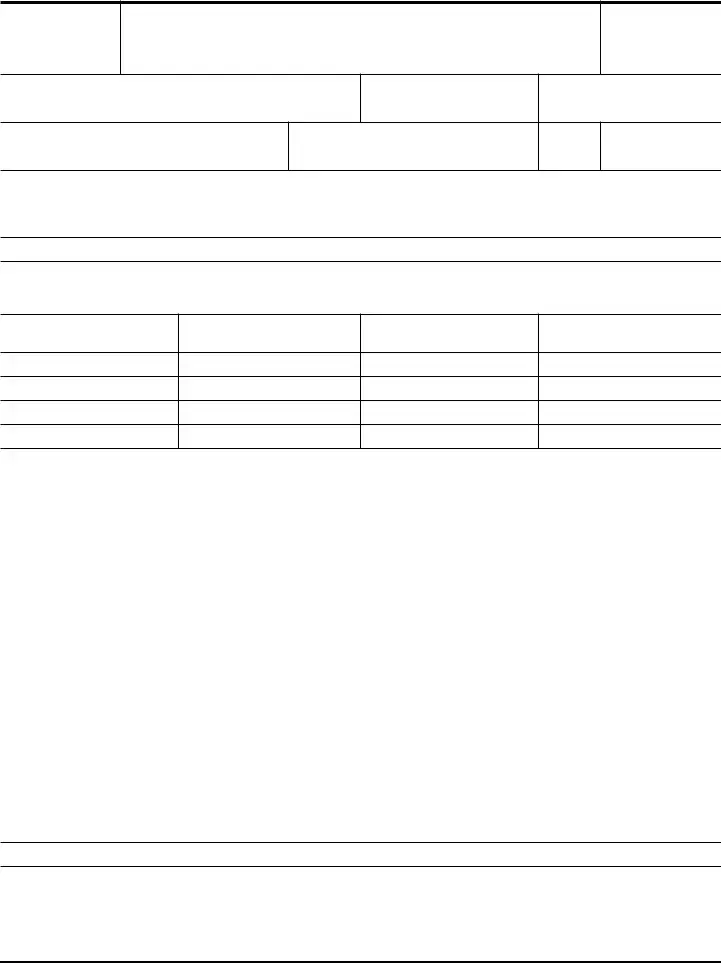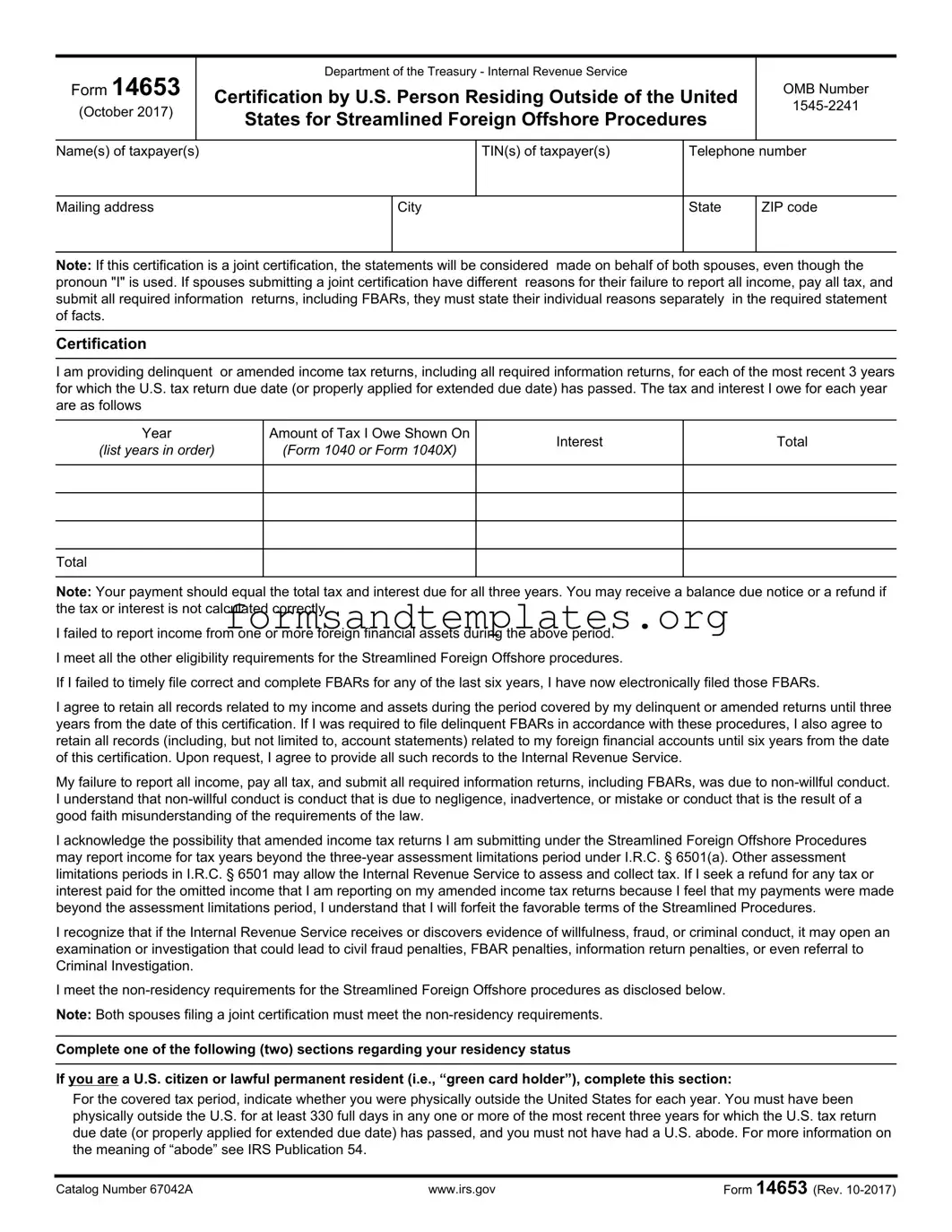Printable 14653 Template
The 14653 form is a crucial document for U.S. persons living abroad who need to rectify their tax reporting status under the Streamlined Foreign Offshore Procedures. This form serves as a certification that individuals have failed to report income, pay taxes, or submit required information returns, such as Foreign Bank Account Reports (FBARs), due to non-willful conduct. It requires taxpayers to provide detailed information about their residency status, including whether they were physically outside the United States for at least 330 days in any of the last three tax years. The form also mandates the submission of delinquent or amended tax returns for the previous three years, along with the associated tax and interest owed. Additionally, it emphasizes the importance of maintaining records related to foreign financial accounts and assets for a specified period. Taxpayers must explain their reasons for non-compliance, providing a narrative that includes personal and financial backgrounds, as well as any advice received from professionals. By completing this form accurately, individuals can seek penalty relief while ensuring they meet the eligibility requirements set forth by the IRS.
Common mistakes
-
Neglecting to provide a complete narrative statement: A common mistake is failing to include a detailed explanation of the reasons for not reporting all income or submitting required information returns. Without this narrative, the submission may be deemed incomplete.
-
Incorrectly calculating tax and interest: Many individuals miscalculate the total tax and interest owed for the three years in question. This error can lead to receiving a balance due notice or a refund due to incorrect figures.
-
Not meeting residency requirements: Some filers do not verify whether they meet the non-residency requirements. It is crucial to confirm that you were physically outside the U.S. for at least 330 full days within the specified time frame.
-
Omitting necessary attachments: Individuals often forget to attach required computations or documentation that demonstrate they did not meet the substantial presence test. This omission can result in an incomplete submission.
-
Joint filers failing to coordinate: When submitting a joint certification, both spouses must meet the same requirements. Failing to disclose differing residency statuses or reasons for non-compliance can complicate the process.
-
Not retaining required records: Filers sometimes overlook the requirement to keep records related to income and foreign financial accounts. Retaining these records for the specified duration is essential for compliance.
-
Misunderstanding non-willful conduct: Some individuals incorrectly interpret what constitutes non-willful conduct. It is important to understand that this term refers to negligence or good faith misunderstandings, not intentional actions.
-
Failing to provide advisor information: If you relied on professional advice, not including the advisor's details can hinder the submission. Providing this information helps clarify your position and the rationale behind your actions.
Find Common Documents
Florida Family Law Financial Affidavit Short Form - The form is particularly useful for individuals with straightforward financial situations.
The California Power of Attorney for a Child form is a vital legal document for parents or guardians, as it allows for the temporary delegation of decision-making authority to another adult in situations that require immediate attention, such as travel or medical emergencies. For more information on obtaining this essential document, visit California Templates.
Taxs - The 1040 form supports the use of payment plans if taxpayers cannot pay their liabilities immediately.
Key takeaways
Filling out Form 14653 is an important step for U.S. persons living abroad who need to correct their tax filings. Here are key takeaways to keep in mind:
- Eligibility Requirements: Ensure you meet all eligibility requirements for the Streamlined Foreign Offshore Procedures before submitting the form.
- Joint Certification: If filing jointly, both spouses must meet the non-residency requirements. Individual reasons for failure to report must be stated separately if they differ.
- Accurate Reporting: Provide accurate figures for taxes owed, including any interest. Inaccuracies can lead to balance due notices or refunds.
- Record Retention: Keep all records related to your income and assets for at least three years from the date of certification. This includes financial account statements for six years if FBARs are involved.
- Non-Willful Conduct: Clearly state that your failure to report was non-willful. This includes mistakes or misunderstandings regarding tax laws.
- Detailed Narrative: Include a comprehensive narrative explaining your failure to report income. This should cover personal and financial backgrounds, as well as any relevant circumstances.
- Professional Advice: If you relied on a tax advisor, provide their contact information and summarize the advice received. This can support your case for non-willfulness.
Completing Form 14653 accurately and thoroughly is crucial for compliance and to avoid potential penalties. Take your time to ensure all information is correct.
14653 Example

Form 14653
(October 2017)
Department of the Treasury - Internal Revenue Service
Certification by U.S. Person Residing Outside of the United
States for Streamlined Foreign Offshore Procedures
OMB Number
Name(s) of taxpayer(s)
TIN(s) of taxpayer(s)
Telephone number
Mailing address
City
State
ZIP code
Note: If this certification is a joint certification, the statements will be considered made on behalf of both spouses, even though the pronoun "I" is used. If spouses submitting a joint certification have different reasons for their failure to report all income, pay all tax, and submit all required information returns, including FBARs, they must state their individual reasons separately in the required statement of facts.
Certification
I am providing delinquent or amended income tax returns, including all required information returns, for each of the most recent 3 years for which the U.S. tax return due date (or properly applied for extended due date) has passed. The tax and interest I owe for each year are as follows
Year
(list years in order)
Amount of Tax I Owe Shown On
(Form 1040 or Form 1040X)
Interest
Total
Total
Note: Your payment should equal the total tax and interest due for all three years. You may receive a balance due notice or a refund if the tax or interest is not calculated correctly.
I failed to report income from one or more foreign financial assets during the above period.
I meet all the other eligibility requirements for the Streamlined Foreign Offshore procedures.
If I failed to timely file correct and complete FBARs for any of the last six years, I have now electronically filed those FBARs.
I agree to retain all records related to my income and assets during the period covered by my delinquent or amended returns until three years from the date of this certification. If I was required to file delinquent FBARs in accordance with these procedures, I also agree to retain all records (including, but not limited to, account statements) related to my foreign financial accounts until six years from the date of this certification. Upon request, I agree to provide all such records to the Internal Revenue Service.
My failure to report all income, pay all tax, and submit all required information returns, including FBARs, was due to
I acknowledge the possibility that amended income tax returns I am submitting under the Streamlined Foreign Offshore Procedures may report income for tax years beyond the
I recognize that if the Internal Revenue Service receives or discovers evidence of willfulness, fraud, or criminal conduct, it may open an examination or investigation that could lead to civil fraud penalties, FBAR penalties, information return penalties, or even referral to Criminal Investigation.
I meet the
Note: Both spouses filing a joint certification must meet the
Complete one of the following (two) sections regarding your residency status
If you are a U.S. citizen or lawful permanent resident (i.e., “green card holder”), complete this section:
For the covered tax period, indicate whether you were physically outside the United States for each year. You must have been physically outside the U.S. for at least 330 full days in any one or more of the most recent three years for which the U.S. tax return due date (or properly applied for extended due date) has passed, and you must not have had a U.S. abode. For more information on the meaning of “abode” see IRS Publication 54.
Catalog Number 67042A |
www.irs.gov |
Form 14653 (Rev. |

Page of
I was physically outside the United States for at least 330 full days (answer Yes or No for each year)
Year
Yes
No
Both spouses filing a joint certification must meet the
If you are not a U.S. citizen or lawful permanent resident, complete this section:
If you are not a U.S. citizen or a lawful permanent resident, please attach to this certification your computation showing that you did not meet the substantial presence test under I.R.C. sec. 7701(b)(3). Your computation must disclose the number of days you were present in the U.S. for the three years included in your Streamlined Foreign Offshore Procedures submission and the previous two years. If you do not attach a complete computation showing that you did not meet the substantial presence test, your submission will be considered incomplete and your submission will not qualify for the Streamlined Foreign Offshore Procedures.
Both spouses filing a joint certification must meet the
Note: You must provide specific facts on this form or on a signed attachment explaining your failure to report all income, pay all tax, and submit all required information returns, including FBARs. Any submission that does not contain a narrative statement of facts will be considered incomplete and will not qualify for the streamlined penalty relief.
Provide specific reasons for your failure to report all income, pay all tax, and submit all required information returns, including FBARs. Include the whole story including favorable and unfavorable facts. Specific reasons, whether favorable or unfavorable to you, should include your personal background, financial background, and anything else you believe is relevant to your failure to report all income, pay all tax, and submit all required information returns, including FBARs. Additionally, explain the source of funds in all of your foreign financial accounts/assets. For example, explain whether you inherited the account/asset, whether you opened it while residing in a foreign country, or whether you had a business reason to open or use it. And explain your contacts with the account/asset including withdrawals, deposits, and investment/ management decisions. Provide a complete story about your foreign financial account/asset. If you relied on a professional advisor, provide the name, address, and telephone number of the advisor and a summary of the advice. If married taxpayers submitting a joint certification have different reasons, provide the individual reasons for each spouse separately in the statement of facts. The field below will automatically expand to accommodate your statement of facts.
Catalog Number 67042A |
www.irs.gov |
Form 14653 (Rev. |

Page of
Under penalties of perjury, I declare that I have examined this certification and all accompanying schedules and statements, and to the best of my knowledge and belief, they are true, correct, and complete.
Signature of Taxpayer |
Name of Taxpayer |
Date |
|
|
|
Signature of Taxpayer (if joint certification) |
Name of Taxpayer (if joint certification) |
Date |
|
|
|
For Estates Only
Signature of Fiduciary |
Date |
|
|
Title of Fiduciary (e.g., executor or administrator)
Name of Fiduciary
For Paid Preparer Use Only (the signature of taxpayer(s) or fiduciary is required even if this form is signed by a paid preparer)
Signature of Preparer |
Name of Preparer |
|
|
Date |
|
|
|
|
|
Firm’s name |
|
|
|
Firm’s EIN |
|
|
|
|
|
Firm’s address |
City |
|
State |
ZIP code |
|
|
|
|
|
Telephone number |
PTIN |
|
|
Check if |
|
|
|
|
|
|
|
|
|
|
|
|
|
|
|
Do you want to allow another person to discuss this form with the IRS |
Yes (complete information below) |
No |
||
|
|
|
|
|
Designee’s name |
|
|
Telephone number |
|
|
|
|
|
|
Privacy Act and Paperwork Reduction Notice
We ask for the information on this certification by U.S. person residing in the United States for streamlined domestic offshore procedures to carry out the Internal Revenue laws of the United States. Our authority to ask for information is sections 6001, 6109, 7801, 7803 and the regulations thereunder. This information will be used to determine and collect the correct amount of tax under the terms of the streamlined filing compliance program. You are not required to apply for participation in the streamlined filing compliance program. If you choose to apply, however, you are required to provide all the information requested on the streamlined certification. You are not required to provide the information requested on a document that is subject to the Paperwork Reduction Act unless the document displays a valid OMB control number. Books or records relating to a document or its instructions must be retained as long as their contents may become material in the administration of any Internal Revenue law. Generally, tax returns and return information are confidential, as required by section 6103. Section 6103, however, allows or requires the Internal Revenue Service to disclose or give this information to others as described in the Internal Revenue Code. For example, we may disclose this information to the Department of Justice to enforce the tax laws, both civil and criminal, and to cities, states, the District of Columbia, and U.S. commonwealths or possessions to carry out their tax laws. We may also disclose this information to other countries under a tax treaty, to federal and state agencies to enforce federal nontax criminal laws, or to federal law enforcement and intelligence agencies to combat terrorism. Failure to provide this information may delay or prevent processing your application. Providing false information may subject you to penalties. The time needed to complete and submit the streamlined certification will vary depending on individual circumstances. The estimated average time is: 8 hours
Catalog Number 67042A |
www.irs.gov |
Form 14653 (Rev. |
Understanding 14653
-
What is Form 14653 and who needs to use it?
Form 14653 is a certification form used by U.S. persons residing outside the United States who want to participate in the Streamlined Foreign Offshore Procedures. This form is designed for individuals who have not reported all income, paid all taxes, or submitted all required information returns, including FBARs (Foreign Bank Account Reports). If you meet the eligibility requirements and have non-willful conduct regarding your tax obligations, you may need to complete this form to benefit from the streamlined procedures.
-
What information do I need to provide on Form 14653?
When filling out Form 14653, you will need to provide various pieces of information, including:
- Your name(s), Tax Identification Number(s) (TIN), and contact details.
- A statement of facts explaining your failure to report all income and file required returns.
- A list of the delinquent or amended income tax returns for the past three years, including the tax and interest owed for each year.
- Confirmation that you have electronically filed any necessary FBARs for the last six years.
- Your residency status, indicating whether you were physically outside the U.S. for at least 330 full days in any of the three years covered by the form.
Ensure that you provide a complete narrative of your situation, including any relevant background information.
-
What happens if I fail to provide all required information?
If you do not include all necessary information on Form 14653, your submission may be considered incomplete. This could result in your application being denied for the Streamlined Foreign Offshore Procedures. It is crucial to provide a detailed statement of facts explaining your situation, including reasons for any non-compliance with tax obligations. Incomplete submissions will not qualify for the streamlined penalty relief, so be thorough in your explanations.
-
What are the consequences of providing false information on Form 14653?
Providing false information on Form 14653 can lead to serious consequences. The Internal Revenue Service (IRS) may impose penalties for inaccuracies. Additionally, if the IRS discovers evidence of willfulness or fraud, it may initiate an examination or investigation. This could result in civil fraud penalties, FBAR penalties, or even criminal charges. It is essential to be truthful and accurate in all your disclosures to avoid these potential repercussions.
How to Use 14653
Once you have gathered the necessary information, you can begin filling out Form 14653. This form is essential for certifying your compliance with U.S. tax obligations while residing outside the United States. Follow these steps carefully to ensure accuracy and completeness.
- Provide Taxpayer Information: Enter your name(s), Tax Identification Number(s) (TIN), telephone number, mailing address, city, state, and ZIP code.
- Certification Statement: Confirm that you are submitting delinquent or amended income tax returns for the last three years. List the years, the amount of tax owed, interest, and total amount due.
- FBAR Compliance: Indicate whether you have electronically filed any overdue FBARs (Foreign Bank Account Reports) for the last six years.
- Record Retention Agreement: Agree to retain all records related to your income and assets for three years from the date of certification, and FBAR records for six years if applicable.
- Non-Willful Conduct Declaration: Acknowledge that your failure to report income was due to non-willful conduct.
- Residency Status: Complete the appropriate section based on whether you are a U.S. citizen or lawful permanent resident. Confirm your physical presence outside the U.S. for at least 330 days in the relevant years.
- Statement of Facts: Provide a detailed narrative explaining your reasons for failing to report income, pay tax, and submit required information returns. Include all relevant details about your foreign financial accounts.
- Signatures: Sign and date the form. If filing jointly, both spouses must sign. Include the signature of a fiduciary if applicable.
- Paid Preparer Information: If a paid preparer assists you, they must provide their signature, name, firm name, and contact information.
- Designee Information: If you wish to allow another person to discuss this form with the IRS, provide their name and telephone number.
After completing the form, review it carefully to ensure all information is accurate. Submit the form along with any required documentation to the IRS as directed. Ensure you keep copies for your records.
